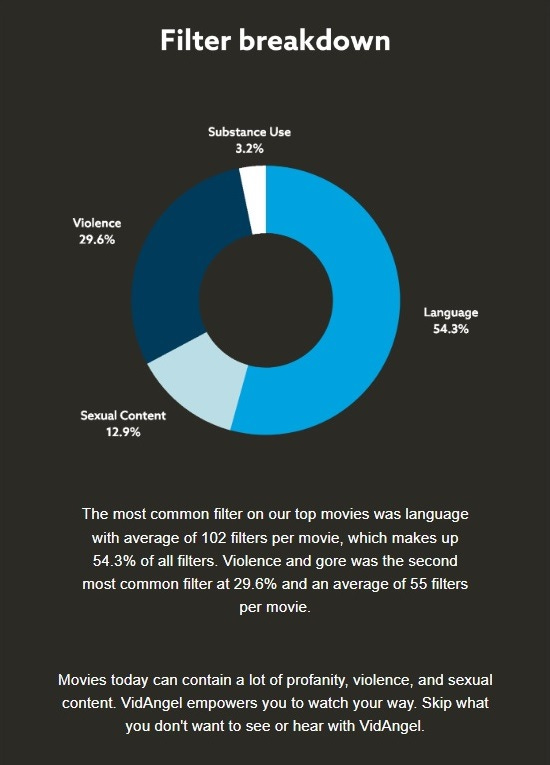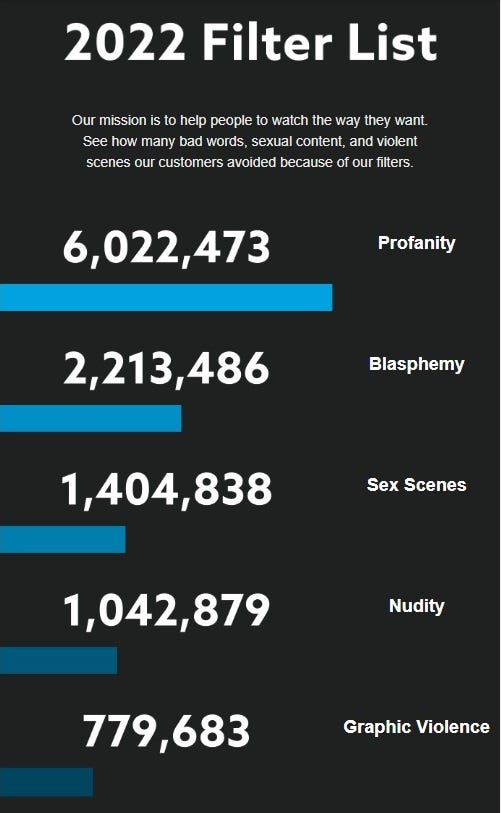The Hidden Cost of Filtering Sexual Content
When Christian ethics are sabotaged by consumerist tactics

It’s time to complete our short series on movie filtering services. (The previous two entries can be found here and here.) And since VidAngel is the premier offering of such services in today’s marketplace, we will zero in on its specific business model.
VidAngel offers five categories of filters:
Language
Sex/Nudity/Immodesty
Violence/Blood/Gore
Alcohol or Drug Use
Other Elements1
Within each of these five categories are numerous subcategories, making the filtering of any given film or show highly customizable. While there are obvious appeals to personalized filtering, such a practice ends up training audiences to view entertainment largely, if not exclusively, in consumerist terms. Whereas a Christian is called to an outward, neighbor-loving posture in all of life, filtering services can, without proper safeguards, encourage us in developing an inward, self-serving posture.
And as I have previously pointed out, this danger shows up most egregiously in how we willingly patronize hypersexualized content, which pornifies, dehumanizes, and objectifies its actors. We may slap a “no harm, no foul” label on filtering such content (since we can skip the sex scenes), but the functional—and consumerist—reality is that we are subsidizing the entertainment industry’s treatment of “sex as [a] commodity and sexualized bodies as cheap goods for widespread consumption.” Patronizing a product and promoting a product are two sides of the same coin. A filtering service only provides the illusion of being able to choose one without the other.
Because this is such an important point, let me put it another way. Not only does a consumerist posture make us think too much about ourselves (our own preferences, desires, and interests), it also blinds us to the reality that our patronage directly contributes to the continued production of sexualized entertainment. In trying to avoid the pornification of our entertainers, we are actually perpetuating the pornification of our entertainers. With every purchased film or streamed show, we are telling the entertainment industry, “More like this, please.”
Imagine a rich person protected from a poisonous public water supply by an expensive purifier only he can afford. He deceives himself if he concludes the poisoned water isn’t hurting anyone else simply because he isn’t affected. And if he thinks his water purifier is all that’s needed to solve the problem, he won’t be motivated to work toward any meaningful change in the water supply because he isn’t being negatively affected.2
Filter Breakdown
At the end of 2022, VidAngel shared some yearly stats with those on its email list (which includes yours truly). In an email entitled, “What’s in your movies?” (sent on 12/16/22), the company stated, “We looked at all the filters for the 50 most-watched movies of this year on VidAngel.” They shared a graph (pictured below) that broke down those filters by category.
As you can see, over half of the filters employed were for language. Nearly a third were for violence. Just over ten percent were for sexualized content. To a degree, this is good news, in that it shows how “Sexual Content” is lower on the list of items audiences are willing to tolerate (if they can filter it out).
Those aren’t the only stats, however. Another VidAngel email, entitled “Make it PG for 2023” (sent on 12/23/22), shared some additional stats from the year, a portion of which is shown below.
In 2022, VidAngel encouraged families to patronize films and shows with a combined total of 1.4 million sex scenes and over 1 million instances of nudity (much of it sexualized3). This includes, as you will see below, media that these families normally wouldn’t have even considered patronizing. But because they could “watch however the bleep they want” (to borrow from VidAngel’s clever slogan), they didn’t care about “however the bleep the actors were objectified” for a viewing audience.
The Poison of Consumerism
In a tragic sense of irony, audiences are using VidAngel to patronize products with the poison of sexual objectification, not realizing their own consumption of the poison of consumerism. I recently wrote a lengthy article about this very topic for Christ and Pop Culture, entitled The Hidden Consumerism of Movie Filtering Services. Because it is currently behind a paywall (though I am told that will change in the future), let me quote a relevant section here:
[S]ome of [VidAngel’s] most-watched filtered shows in recent history include the extremely sexually explicit Bridgerton and The Witcher (not to mention Game of Thrones in years past). By reducing the skipping of sex scenes to an exact science, VidAngel allows audiences an even greater sense of freedom to spend more time and resources on visual stories they otherwise wouldn’t have touched with a ten-foot Valyrian sword.
And now that VidAngel has given them a soft pair of velvet gloves, they are comfortable feeling up these shows (and their actors) with impunity, as if there’s a disconnect between viewer patronage and actor objectification.
I then quote a previous article of mine (which is not behind a paywall):
Too many of us have experienced no qualms about financially supporting [or streaming] sexually charged entertainment, fast-forwarding through the inappropriate content, and then washing our hands of any guilt, choosing rather to blame the actress for getting herself into that mess in the first place.
We willingly participate in the pornification of these actors and then criticize the actors for being willing to participate in their own pornification. But the consumer can’t claim innocence when he supports a product he says he morally objects to. It’s not a product of necessity, essential for his survival; it’s simply a product he wishes to enjoy, humane filming practices be damned. Through his actions, he is showing that his own entertainment is more important than the good of others and the financial starvation of pornified content.
The Antidote of Neighborly Love
Because Christianity involves both “putting off” and “putting on,” let’s end this blog series by looking at three exhortations I include in my Christ and Pop Culture piece above:
First, look outward more than inward. We’ve spent so much time focusing on how Hollywood performers can be a stumbling block to us that we’ve missed how our consumerist actions can be a stumbling block to them. As I’ve written elsewhere, “A Good Samaritan will treat others not as obstacles to be ignored or overcome, but as human beings that we are called to love in the same way God has loved us.” Recognize that your viewing habits should be designed to embody both the first and second greatest commandments.
Second, avoid overreacting to the problem by applying legalistic rules to yourself and/or others. It is not inherently sinful to subscribe to a streaming service if you are careful about what you patronize. It is also not inherently sinful to use a filtering service like VidAngel. The focus of this article has been the sexual exploitation of actors, but there are plenty of other reasons to skip or mute various scenes (e.g., violence, profanity). To a degree, these “other reasons” are issues of conscience, which we must leave for individuals and families to decide on their own.
Third, recognize that the farther we move away from generalities (i.e., choosing which streaming service to subscribe to or which filtering service to use), and the nearer we get to specifics (i.e., which movies we choose to purchase or stream), the closer we come to clear definitions of right and wrong. As much as it lies within your power, refuse to be a party to the sexual degradation of actors. When possible, deny or delay the gratification of your desires for entertainment so you may cultivate a posture of…self-sacrificing love. Denying your gratification may mean skipping a show or film entirely. Delaying your gratification might mean waiting until you can acquire a used DVD so you avoid any directly measurable contribution to actor dehumanization.
In short, recognize that participating in the sexual exploitation of human beings made in the image of God is not a conscience issue; it is a justice issue. That holds true for straight-up porn, but it also holds true for the refined and respectable softcore porn that has seeped into nearly all forms of mainstream entertainment.
A Christian ethic does not demand that we watch the latest show so we can stay “in the know.” It does not attach the adjective “must see” to popular theatrical releases. It does not call us to devalue the pornification of others simply because we can shield ourselves from some of its effects. What it does require is that we love our neighbors as ourselves.
May our movie and TV and filtering choices be a clear reflection of this reality. May we love our entertainers as we love ourselves. The wellbeing of these image-bearers, and the glory of he whose image they bear, is at stake.
This is the final post in a three-part series on movie filtering services. For the previous entry, see The Unintentional Selfishness of Using Content Filtering Services.
Among the “other elements” are the opening and closing credits—the skipping of which, in my house, is considered unthinkable.
Some might object to consumers being compared to a wealthy elitist, since it is the movie star (and not the moviegoer) who has gobs of money. My point, however, is simply that consumers hold more power in this instance than the typical actor does. While the consumer can skip the process of watching any given sex scene, an actor cannot skip the process of filming it; there is no escape for him or her. In this particular scenario, it is the consumer who has more control than the actor—and as long as the consumer can protect himself, he does not give a second thought to how others are being detrimentally affected by his entertainment choices.
I add the above parenthetical statement (even if it isn’t explicitly stated in VidAngel’s stats) simply because a large portion of the nudity in today’s entertainment is sexualized.



